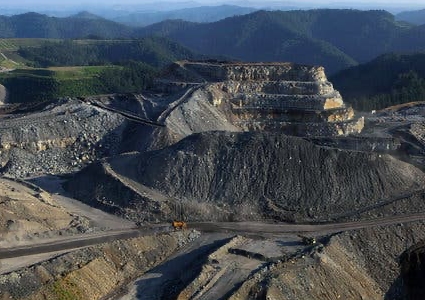Trustee Elections
These are the original issues in this subcategory
- ACID MINE DRAINAGE
- HARDROCK MINING
- MOUNTAINTOP REMOVAL MINING
Mountaintop removal (MTR) mining, sometimes called strip mining, is a surface mining method which removes a mountain’s summit to expose its coal deposits beneath. Since it began in 1970, MTR mining has become the most common method of coal mining in our Appalachian region which includes West Virginia, Virginia, Kentucky and Tennessee. In this process, mountaintops are first cleared of forest, vegetation and topsoil. Powerful explosives are then used to blast as much as 800 feet off the top of a mountain. Huge mechanical shovels, called draglines, are used to dig through the layer of rock to access the coal seam. Excess rock and soil is hauled away on trucks and usually deposited into adjacent valleys. Huge amounts of chemically-treated water is then used to wash the extracted coal to prepare it for market. The resulting waste water is laden with coal dust, carcinogenic chemicals and harmful metals such as mercury and arsenic. This toxic slurry mix often migrates into the water supplies upon which residents depended.
Although mining companies are required to restore these mountaintops when finished, advocates say these measures are often inadequate, saying these sites remain infertile long after miners have left. MTR mining is relatively inexpensive since it requires a much smaller workforce than conventional mining, but it is very costly in terms of human and environmental damage. Opponents say MTR mining is responsible for annihilating ecosystems, polluting waterways and causing great harm to the Appalachian people. Many studies have shown that compared to their peers, these Americans suffer more than a 50% higher rate of cancers and more than a 40% higher rate of birth defects from contaminated water and airborne dust and toxins produced by MTR mining. The monetary public health costs associated with this human tragedy are estimated to be at least $75 billion each year. Critics say this method of mining would not be as nearly profitable if companies were held responsible for polluting the air, water and lands of these American communities.
Pending Legislation: H.R.2073 - ACHE Act
Sponsor: Rep. John Yarmuth (KY)
Status: House Subcommittee on Health (Energy and Commerce)
Speaker: Rep. Anna Eshoo (CA)
Although mining companies are required to restore these mountaintops when finished, advocates say these measures are often inadequate, saying these sites remain infertile long after miners have left. MTR mining is relatively inexpensive since it requires a much smaller workforce than conventional mining, but it is very costly in terms of human and environmental damage. Opponents say MTR mining is responsible for annihilating ecosystems, polluting waterways and causing great harm to the Appalachian people. Many studies have shown that compared to their peers, these Americans suffer more than a 50% higher rate of cancers and more than a 40% higher rate of birth defects from contaminated water and airborne dust and toxins produced by MTR mining. The monetary public health costs associated with this human tragedy are estimated to be at least $75 billion each year. Critics say this method of mining would not be as nearly profitable if companies were held responsible for polluting the air, water and lands of these American communities.
Pending Legislation: H.R.2073 - ACHE Act
Sponsor: Rep. John Yarmuth (KY)
Status: House Subcommittee on Health (Energy and Commerce)
Speaker: Rep. Anna Eshoo (CA)

- I oppose reforming current mountaintop removal mining policy and wish to donate resources to the campaign committee of Speaker Nancy Pelosi (CA).
- I support studying the health impacts of mountaintop-removal coal mining on individuals in the surrounding communities by:
1.) Applying this legislation to surface coal mining that uses blasting with explosives in the steep slope regions of Kentucky, Tennessee, West Virginia and Virginia.
2.) Requiring the Department of Health and Human Services (HHS), upon receiving the results of these studies, to determine whether such mining presents any health risks to individuals in those communities.
3.) Prohibiting specified agencies from issuing permits for any mountaintop-removal coal mining project or expansion unless HHS determines that such mining does not present any health risk to individuals in the surrounding communities.
4.) Requiring monitoring of air, water and soil for pollution, including noise pollution, until HHS makes its determination, which must also publish pollution-monitoring results.
5.) Assessing a one-time fee on existing mining projects, sufficient to cover the federal cost of the studies and pollution monitoring required by this bill.
And wish to donate resources to the campaign committee of Rep. Anna Eshoo (CA) and/or to an advocate group currently working with this issue.
- I support studying the health impacts of mountaintop-removal coal mining on individuals in the surrounding communities by:
1.) Applying this legislation to surface coal mining that uses blasting with explosives in the steep slope regions of Kentucky, Tennessee, West Virginia and Virginia.
2.) Requiring the Department of Health and Human Services (HHS), upon receiving the results of these studies, to determine whether such mining presents any health risks to individuals in those communities.
3.) Prohibiting specified agencies from issuing permits for any mountaintop-removal coal mining project or expansion unless HHS determines that such mining does not present any health risk to individuals in the surrounding communities.
4.) Requiring monitoring of air, water and soil for pollution, including noise pollution, until HHS makes its determination, which must also publish pollution-monitoring results.
5.) Assessing a one-time fee on existing mining projects, sufficient to cover the federal cost of the studies and pollution monitoring required by this bill.
And wish to donate resources to the campaign committee of Rep. Anna Eshoo (CA) and/or to an advocate group currently working with this issue.
There has been $0.00 pledged in support of this issue
Trustee Election - Opening Date
September 19, 2022
Trustee Election - Closing Date
September 26, 2022